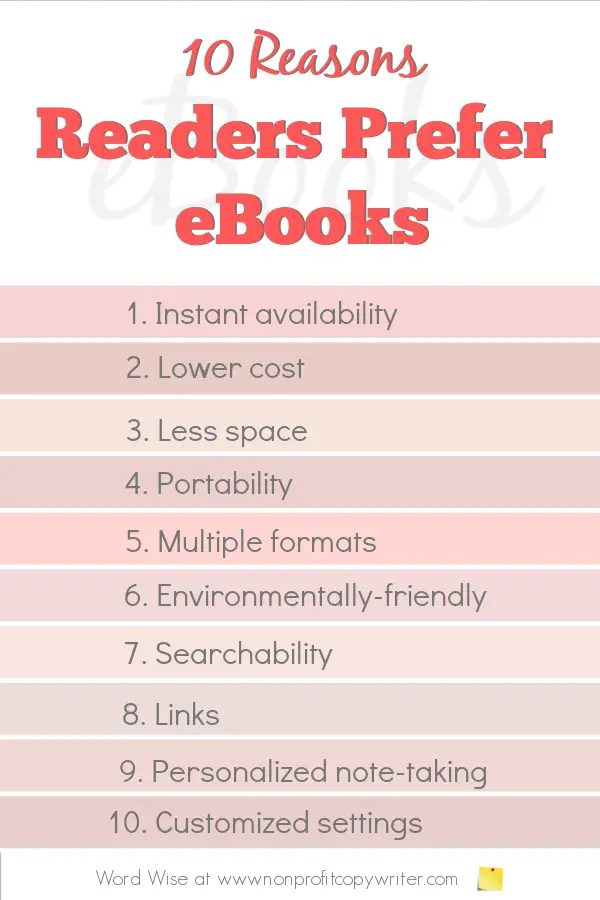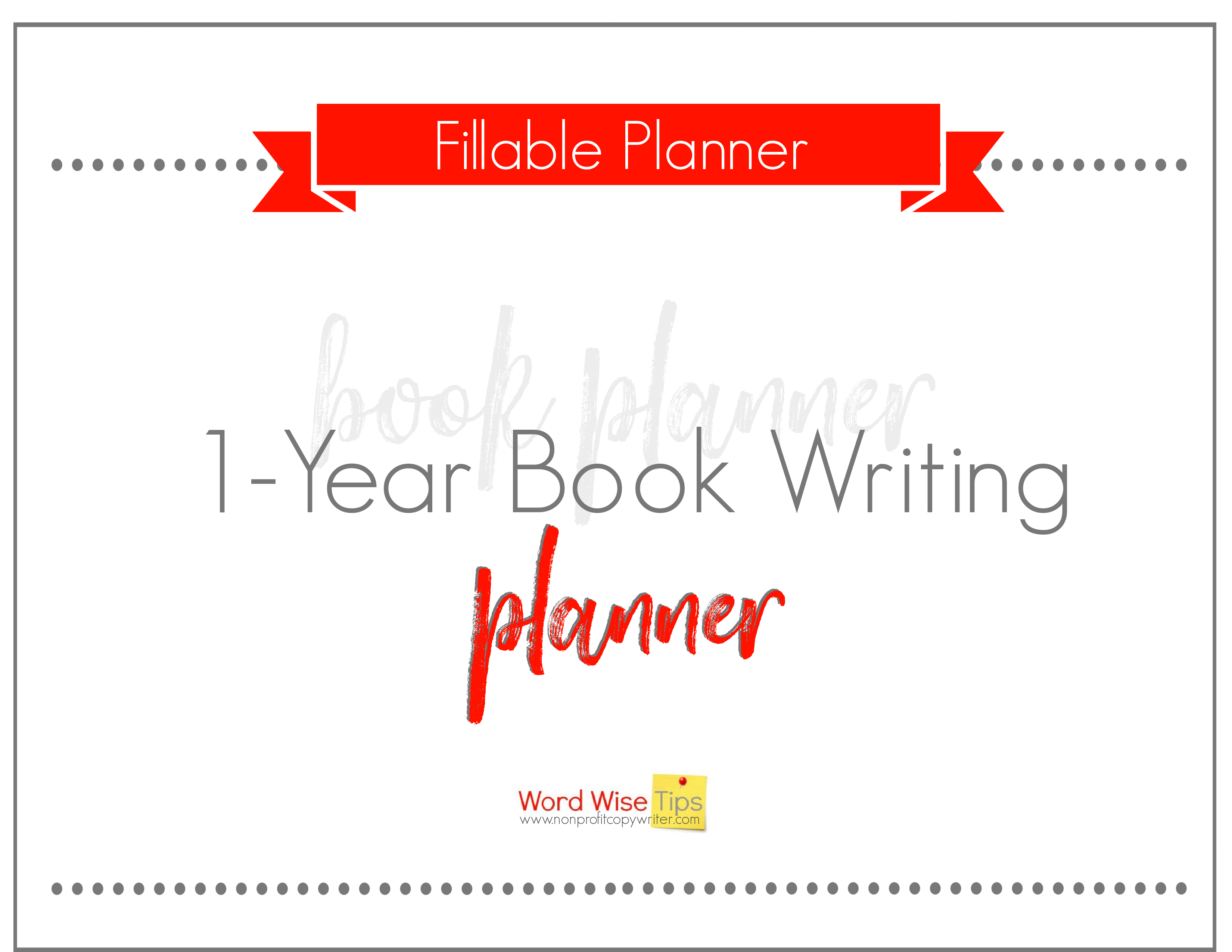Save Time: Get 5 Simple Writing Tips
you can put to use in 10 minutes
E-Books Versus Print Books: 10 Reasons Your Readers Prefer the E-Version
Award-winning writer Kathy Widenhouse has helped hundreds of nonprofits and writers produce successful content , with 750K+ views for her writing tutorials. She is the author of 9 books. See more of Kathy’s content here.
Updated 5.26.25
For years, I fluctuated back and forth in the e-books versus print books debate.
Should I jump on the electronic book bandwagon? On the plus side, I knew that writing an e-book meant creative freedom, faster time to publication, a global market, and low risk. On the other hand, writing an e-book meant marketing it myself (horrors!) and possibly losing my investment costs.
Even so, e-books offered distinct benefits that print cannot. For me, the hesitation to move forward with an e-book project was practical. Where should I start? The prospect seemed overwhelming.
Yet the electronic space continued to explode. The digital market was huge and I was passing it by. I found I needed to take a step away from my writer’s perch and put myself in my reader’s shoes in the e-book versus print books debate. Why was digital so appealing to my reader … and why might she prefer e-books to traditional print books?
The e-books versus print books debate
1. E-books are instantly available
Rhonda Reader likes instant. She doesn’t need to wait for Amazon to deliver her print book to her doorstep. Nor does she need to take a trip to the library, peruse the shelves, and put her name on a waiting list for a bestseller. E-books allow her to browse selections online, make her choice, download a book immediately, and start reading right away. Plus, e-books are never out of stock.
2. E-books are cheaper
E-books cost less than print books — most of the time. They’re often available on sale for as little as $1-$5 and with no shipping costs(or even free, through online vendors like The Fussy Librarian or even Amazon). And most e-books are accessible through the local library at no cost.
3. E-books take up less space
E-books are stored in the cloud. Because they’re digital, they take up only a fraction of the space that print books consume. When readers go digital, they have fewer volumes to store on their bookshelves, which declutters their lives. Cyberspace storage means e-books are out of sight until Rhonda Reader is ready to download them. She queues up books she’d like to read and then removes them from her e-reader carousel when she’s done.
4. E-books are portable
An e-book, by definition, is a digital product that is downloaded electronically. Most of the time that means to a mobile device, although a handful of consumers prefer to read their e-books on a desktop. An e-book’s flexibility spells less space in a beach bag or travel carryon. They’re portable.
5. E-books offer multiple formats
An e-book can be produced in PDF, ePUB, or .mobi formats — or all three. They’re suitable to read on all kinds of platforms. Readers can have access to your e-book on a phone, tablet, Kindle, Nook, laptop, desktop — even a flash drive.
6. E-books are environmentally-friendly
Because an e-book is digital, there’s no paper. It’s easy on the environment.
7. E-books provide built-in searchability
Not all nonfiction print books have an index and few print works of fiction are formatted for search. E-books, on the other hand, are searchable. This allows Rhonda to type in a keyword and find references with a swipe or click, regardless of the type of e-reading device she uses.
Check out a simple book writing plan that's fillable and re-usable.
8. E-books include links
E-books include hyperlinks that connect your reader to more information or other resources. It’s a useful feature for research (think students) or curious minds that simply want to know more. Plenty of e-readers also have built-in dictionaries, too.
9. E-books allow note-taking
E-readers let you highlight text and add notes. Like print books, the notes stay intact. Rhonda Reader can return to her e-book over and over to see what ideas she jotted in the digital margin.
10. E-book settings can be customized
Rhonda can set up e-readers to her preferences including font type, font size, brightness level, and text-to-speech. Plus, flashlights under nighttime covers are unnecessary because e-readers are backlit. E-books are readable in a dark or low-lit room.
E-books versus print books: consider your reader
Rhonda Reader’s list notwithstanding, plenty of consumers are partial to print books. For some, the preference is tactile — feeling the pages beneath their fingers and turning over corners to mark a spot. They thrive in wandering through a library or bookstore to soak up all the collective creativity. Others like plucking a volume off the shelf and handing it to a friend with a simple, “Read this. It will help.” And fans of print say one of their biggest annoyances is that pesky need to re-charge e-readers each night.
All of that’s to say that print books aren’t going away soon. But if you’re a writer that’s hesitating to jump into the e-book space because you’re intimidated by the tech or don’t know where to start, re-examine your doubts. You’ve already overcome the fear of putting words down on paper. Surely you can overcome your fear of electronic publishing by using the oodles of available indie writer resources to help you format and market your e-book.
So instead of the pat “I-dislike-tech” excuse, dig deeper. Look at your motivations. Why do you write?
For your reader. You want her to read your book. She’s got plenty of reasons she’s choosing an e-book. Which means you do, too.
More eBook Writing Tips
Get Started Writing eBooks: A Simple Tutorial ...
How to Use a Personalized Book Writing Plan to Get Your Book Done ...
Should You Write a Free eBook? Take This Quiz to Find Out ...
How to Write an eBook Fast ...
eBook Writing Software: The Lowdown on Tools for Writing eBooks ...
Writing an eBook? Get started by writing a short one ...
1-Year Book Writing Planner (Fillable and Re-Usable) ...
The Best Product to Sell Online (Especially for Writers) ...
Why You Should Write an eBook: 5 Reasons to Consider It ...
What’s the Best Book Word Count for eBooks?
6 Tips for Writing Good Copy for Your Book Jacket ...
Writing eBooks: Frequently Asked Questions ...
Test Your Book Idea with These 4 Questions ...
How to Get Book Reviews For Free ...
More tips for writing eBooks on our Pinterest board ...
Return from E-Books Versus Print Books to Nonprofit Copywriter home
As an Amazon Associate I earn from qualifying purchases.
Share This Page

Named to 2022 Writer's Digest list
BEST GENRE/NICHE WRITING WEBSITE


Stop Wasting Time!
Grab your exclusive FREE guide, "5 Simple Writing Tips You Can Put to Use in 10 Minutes or Less"













